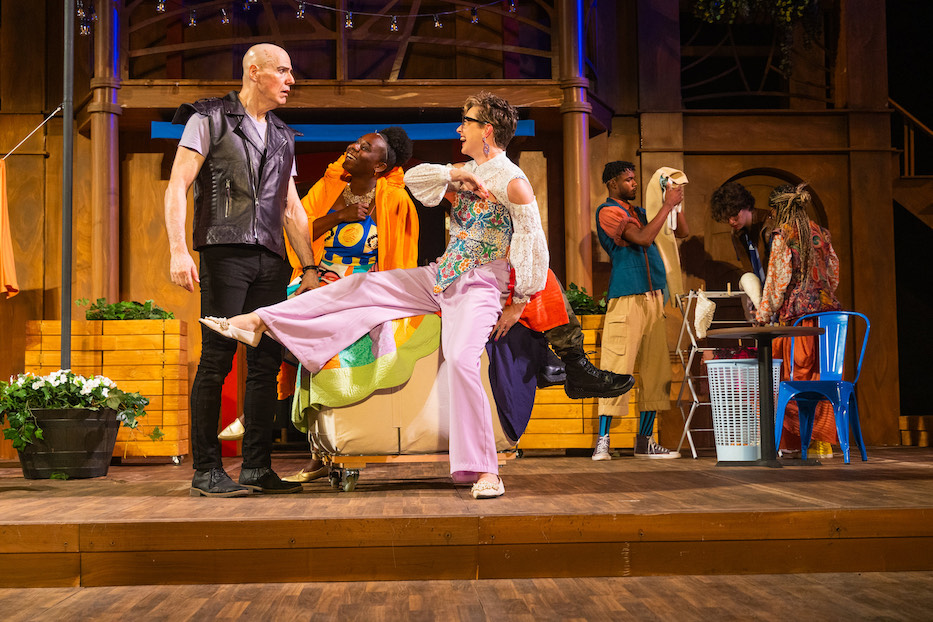
Culture & Community | Edgerton Park | Elm Shakespeare Company | Shakespeare | Arts & Culture | Theater
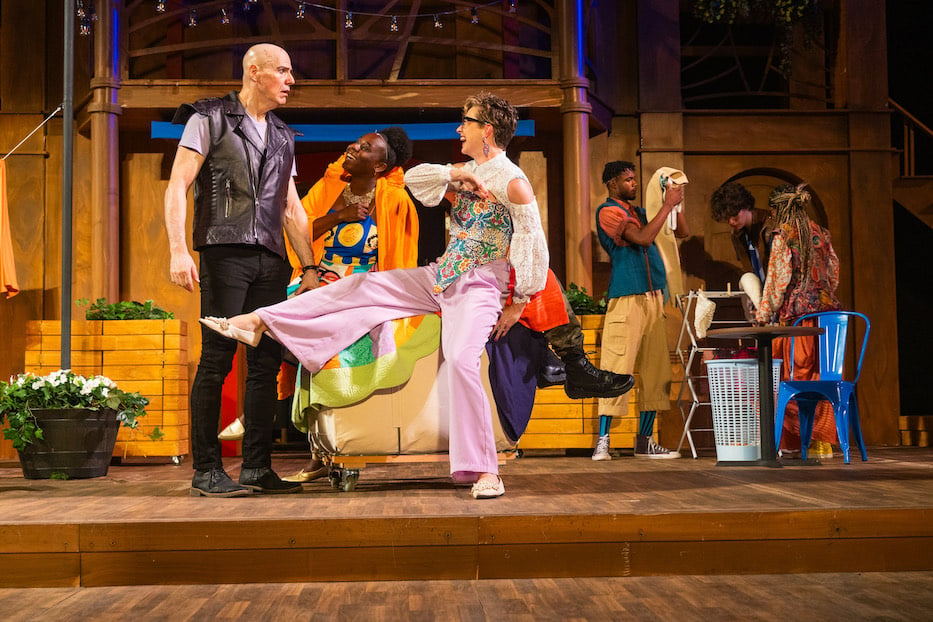
Isabel Chenoweth for Elm Shakespeare Company Photos.
When Master Ford suspects his wife of cheating, he sets into motion an extremely simple plan.
Step one. Get in disguise. Step two. Approach Fasltaff, his wife’s suspected lover, under a fake name. Step three. Claim that he has been trying to woo his wife, Mistress Ford, for years, with no success. Step four. Hire his wife’s suspected lover to seduce his wife for his fake persona, thus proving that she was cheating on him with Falstaff. And also … on ... himself?
This madness is a mere subplot in William Shakeseare’s The Merry Wives of Windsor, now running Tuesdays through Sundays in Edgerton Park through September 3. Directed by Dawn Monique Williams and hosted by Elm Shakespeare Company, the work holds broad comedic style and a deep sense of play while presenting real questions about the play’s relevance to a contemporary audience.
All performances are free and begin at 7:30 p.m.; Elm Shakespeare will post weather-related updates to its Facebook page. More information is available here.
Originally published in 1602, Merry Wives is a bawdy farce that is most successfully performed and witnessed with joy, abandon and a loose attachment to reality. This unhinged comedy follows the antics of John Falstaff (Raphael Massie) as he woos two married and uninterested women, Mistress Page (Abigail Onwunali) and Mistress Ford (Liz Daingerfield). The savvy wives immediately clock Falstaff as a glorified pick up artist, and decide to prank him relentlessly until he expresses remorse.
Meanwhile, Master Page (Malachi Dré Beasley) and Mistress Page are trying to marry off their daughter Anne (Terra Chaney) to the best suitor. Anne, Master Page, and Mistress Page all have very different opinions about who is the best match, and are constantly fighting off the input of the suitors and other townsfolk. At the same time, Master Ford (Walton Wilson) believes his wife is cheating with Falstaff and goes to great lengths to prove it.
When all comes to a head at a midnight-fairy-costume-ball in the local woods, fidelity, clarity and love reign supreme.
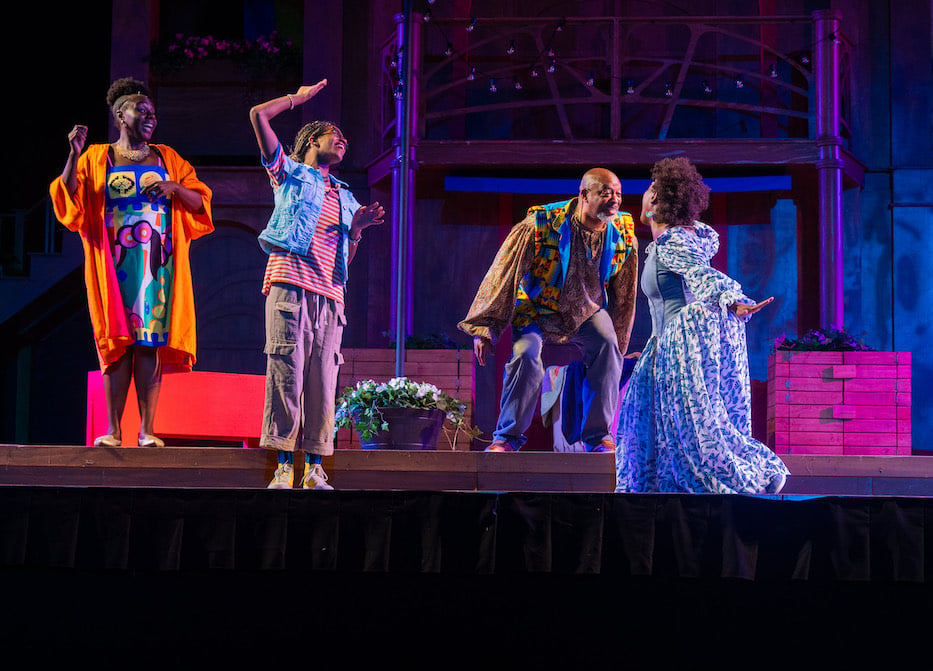
Isabel Chenoweth for Elm Shakespeare Company Photos.
Elm Shakespeare’s rendition plays nicely into the broadness of the play’s style. Using all the best tools in a comedic production’s tool kit—sight gags, sound effects, spectacle, a bit with a door—the production highlights much of the humor and silliness of Shakespeare’s text. For instance, Dr. Caius (James Andreassi) and Parson Hugh Evans (Michael J. Asberry) begin a duel of honor, only to realize they have more to gain by working together. Their duel, meanwhile, devolves into an outsized caricature of a fight.
There are several moments like this that shimmer in the production. Fastaff (Massie) performs love letters to Mistress Ford and Page as spoken word over sultry beats with colorful lights and backup dancers. When her lines need some extra juice, an oft-overlooked Justice Shallow (Gracy Brown) captures the audience’s heart by cracking open a huge fan that reads JUSTICE in white rhinestones.
The aforementioned fairy ball features the ensemble clad in childlike fantasy garb, dancing to an ethereal melody sung by the vibrant Martine Fleurisma. And upon every mention of the highly coveted Anne Page, a lilting sound effect plays while the actors look wistfully at the stars.
The awkward Slender, a reluctant suitor of Anne, is delightfully portrayed by Michael A. Crawford. When Anne asks why he has come to woo her, he responds with perfect honesty: “Truly, for mine own part, I would little or nothing with you.” With no malice in his heart, the character lands as an unwieldy sweetheart.
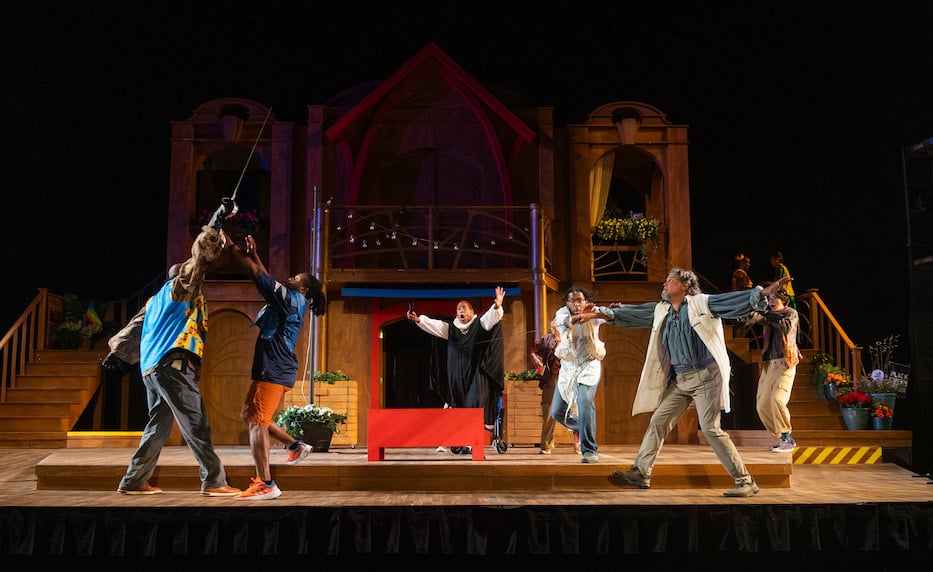
Isabel Chenoweth for Elm Shakespeare Company Photos.
Indeed, comedic chemistry sparks between different duos throughout the piece. Martine Fleurisma and Raphael Massie flirt and flourish as Falstaff and the canny Mistress Quickly. Massie also thrives with Walton Wilson’s Ford. When Ford approaches Falstaff in disguise, the broad physicality and timing between the two actors creates a tone that would fit well in over-the-top comedic classics like The Pink Panther or Airplane!.
Abigail Onwunali and Liz Daingerfield as the “Wives,” meanwhile, display a deft balance of comedic timing, chemistry and facility with Shakespeare’s language and tone. Within that, they also demonstrate a nuanced performance of their characters.
“Wives” in this play only have a certain amount of power. And yet, Mistresses Ford and Page are the orchestrators of chaos and the propellers of plot. They do this by having different faces they show to different people in their lives. There is one face for wife, one for friend, one for mother, one for head of house, one for high-status woman about town.
Mistress Page (Onwunali) shuts down a suitor for her daughter, bolsters another, gets her kid in line, and gives her husband a little affection all in the span of about 15 lines. On opening night last week, it was and remains heartening to see a familiar and contemporary version of the work that goes into presenting “wifeliness” baked into this absurdist comedy.
When Mistress Ford hides Falstaff in a closet (a bit truly too complicated to explain, just see the show) and Mistress Page arrives to warn her of their husbands’ approach, the two slip effortlessly from overacting panic for the sake of Falstaff to real concern with each other about their husbands to enjoyment of the absurd situation they’ve created.
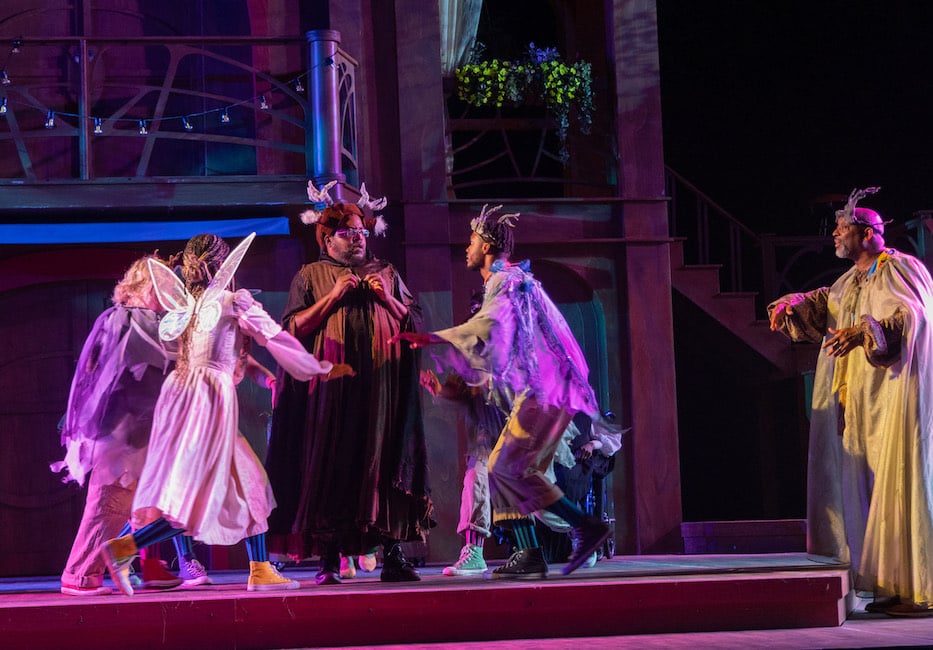
Isabel Chenoweth for Elm Shakespeare Company Photos.
In Act four, Mistress Ford turns to her friend and asks “What think you? May we, with the warrant of womanhood and the witness of a good conscience, pursue him with any further revenge?” Which could also be said as, “Should we keep the joke going?”
It’s a question worth asking about this play overall. While the potential for farce and over-the-top comedy in Shakespeare’s Merry Wives makes it tempting to produce, the text also contains a tremendous amount of anti-fat sentiment, patriarchy, sexism, and outdated tropes.
There is a constant dialogue about Falstaff’s weight, often equating fatness with grotesqueness or undesirability. If Falstaff were presented naturally as a fat man (of which there are some examples in his other appearances across Shakespeare’s cannon) that would be one thing, but here his fatness is used as a descriptive weapon by almost every other character— specifically around how everyone else perceives his wooing of the wives.
One of the biggest jokes of the play is when the wives throw Falstaff into a laundry basket to sneak him past their husbands. It’s arguably a good bit: a skeevy man being tossed in the river with laundry seems appropriate for the play and harmless. However, it is implied that the basket becomes almost too heavy to move so this production, like many others before, plays into that joke, with attendants grunting and panting to move the laundry basket off stage.
The next time the wives sneak Falstaff past their husbands, it is dressed as an old woman. This is obviously supposed to play for laughs because of the characters gender and implied size. But is a man in a dress funny? Do we need this joke for the 100,000th time?
Elm Shakespeare’s production does not push this joke too hard, and seems to be trying to find a middle ground between what is on the page and the contemporary context of putting a cis man in a dress while another cis man chases him around the stage threatening to beat him.
But these are also key plot points of The Merry Wives of Windsor. Without great attention or care taken with them, they will continue to play as jokes that punch down. Is it possible to be in conversation with these tropes? To create something fun, wild, and silly without more insidious themes sneaking into the play?
The Merry Wives of Windsor runs at the Alexander Clark Playhouse Tuesday through Sunday at 7:30 p.m. through September 3rd. Tickets and more information here.

